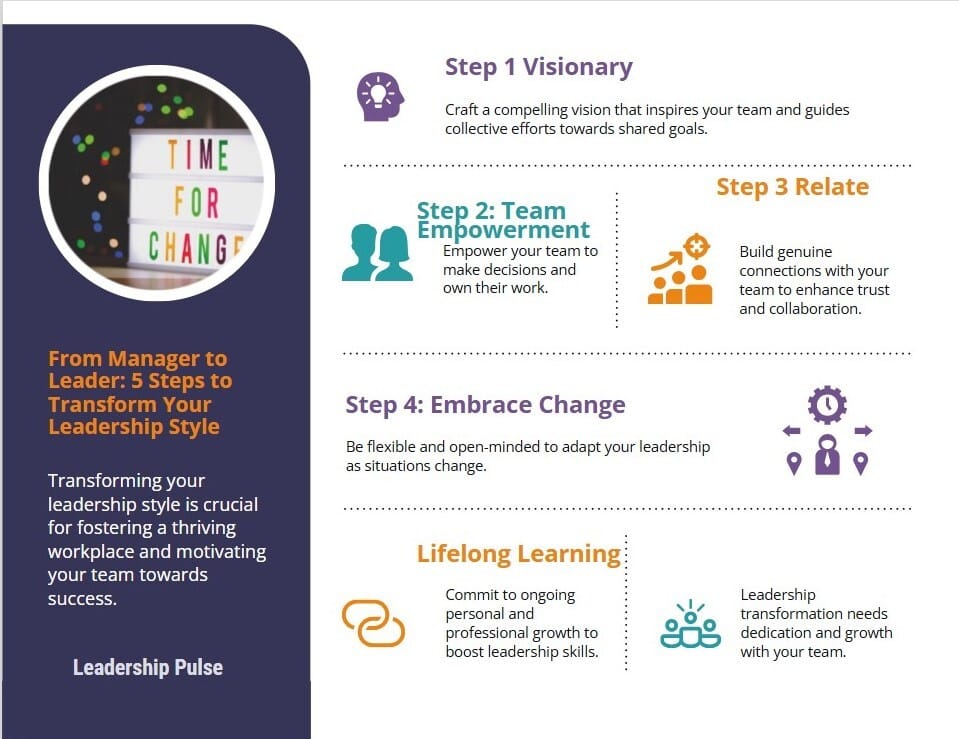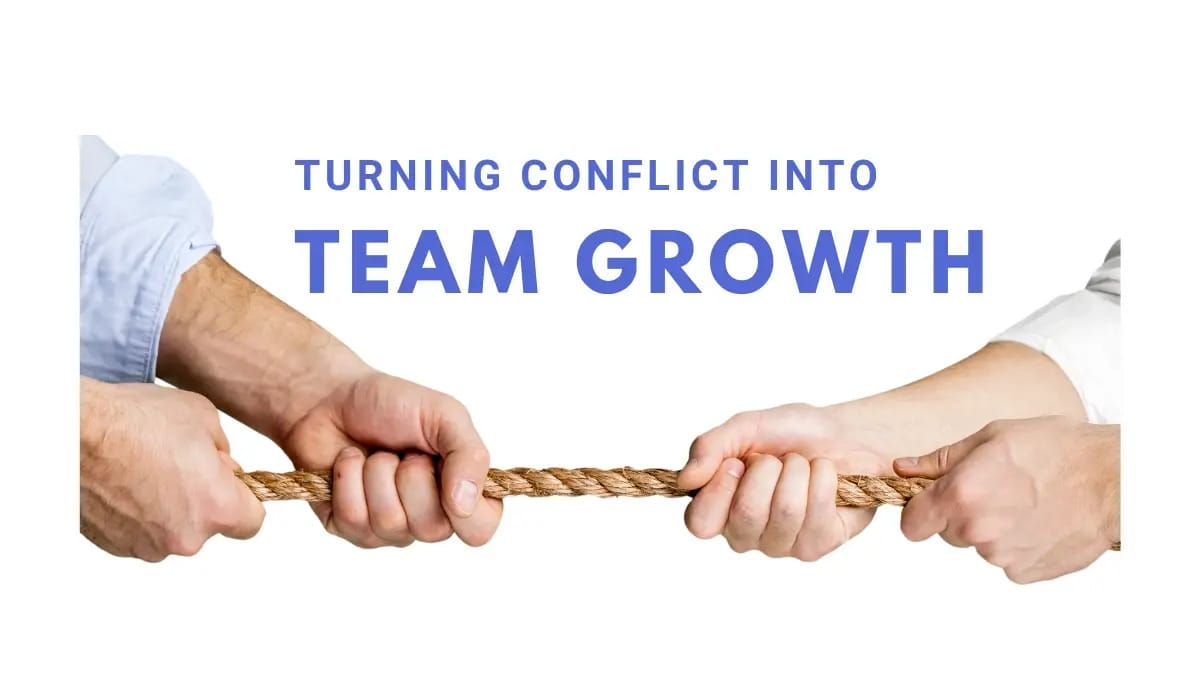- Leadership Pulse
- Posts
- From Manager to Leader: Steps to Transform Your Leadership Style
From Manager to Leader: Steps to Transform Your Leadership Style
Welcome to Leadership Pulse!
I share weekly actionable strategies and lessons from my experiences as a healthcare leader, entrepreneur, and angel investor.
The Leadership Pulse newsletter will equip you with insights for creating lasting impact, whether navigating leadership challenges, building cohesive teams, or scaling a startup.
This week’s topics focus on transforming a leadership style when transitioning from a manager to a leader.
It also provides strategies for turning workplace conflicts into opportunities.
The final topic covers the top global health challenges that every leader should know.
This Week At A Glance
From Manager to Leader: Steps to Transform Your Leadership Style
Leadership extends far beyond merely managing tasks;
It is fundamentally about inspiring others, articulating a compelling vision, and nurturing the growth of your team.
Transitioning from being a manager to becoming an influential leader requires a change in tactics and a fundamental shift in mindset.

Steps to Transform Your Leadership Style:
1. Develop a Vision:
Articulate a clear long-term goal.
Envision where you want your team to be in the future and create a roadmap that inspires them.
When Sundar Pichai became CEO of Alphabet, he set a vision focused on making technology universally accessible and encouraging innovation company-wide.
This vision aligned the team's efforts and instilled a sense of purpose that motivated employees.
2. Empower Your Team:
Learn to delegate responsibilities.
Trusting your team to take ownership of projects is crucial.
Satya Nadella revitalised Microsoft by promoting a culture where employees felt empowered to embrace a growth mindset and innovate without fear of failure.
Encourage your team to take risks and learn from mistakes, which builds confidence and capability.
3. Focus on Relationships:
Develop strong relationships where empathy and authenticity thrive.
Jacinda Ardern, the former Prime Minister of New Zealand, demonstrated this by prioritising compassion to unify her country during crises.
Take the time to engage with your team, listen to their concerns, and understand their motivations, fostering a workplace where everyone feels valued.
4. Adaptability:
Flexibility is essential in today’s fast-paced environment.
Leaders like Elon Musk exhibit adaptability by continuously refining their strategies based on market trends.
Cultivate a culture where change is accepted and expected, equipping your team to navigate challenges and seize opportunities swiftly.
5. Continuous Learning:
In our rapidly evolving world, ongoing education is paramount.
Jeff Bezos often emphasises the importance of maintaining a "Day 1" mindset, which means never becoming complacent and always seeking new knowledge.
Attend workshops, read books, or take online courses to stay current on leadership and industry practices.
Reflection
Which leadership trait can you strengthen this week to move closer to being an inspirational leader?
Start learning AI in 2025
Everyone talks about AI, but no one has the time to learn it. So, we found the easiest way to learn AI in as little time as possible: The Rundown AI.
It's a free AI newsletter that keeps you up-to-date on the latest AI news, and teaches you how to apply it in just 5 minutes a day.
Plus, complete the quiz after signing up and they’ll recommend the best AI tools, guides, and courses – tailored to your needs.
Conflict Resolution: Turning Workplace Disputes Into Growth Opportunities
Conflict in the workplace is inevitable, but how we handle it can lead to destruction or opportunity.
Effective leaders recognise that conflict can catalyse growth and innovation by fostering a culture of resolution and understanding.

Strategies for Turning Conflicts Into Growth
1. Address Issues Early:
Prevent escalation by addressing conflicts promptly.
When issues concerning working conditions arose in Amazon warehouses, swift negotiations led to new health and wellness initiatives, demonstrating how proactive engagement can result in meaningful improvements.
2. Listen Actively:
Take the time to understand each party’s viewpoint without jumping to conclusions.
Indra Nooyi, the former CEO of PepsiCo, exemplified the power of active listening to navigate complex cultural and organisational problems, leading to stronger, more cohesive teams.
3. Focus on Common Goals:
Instead of dwelling on differences, redirect discussions toward shared objectives.
NASA’s Apollo program illustrates this perfectly; despite team conflicts, everyone was united by the mission of landing on the moon.
This showcases how a common goal can bridge divides.
4. Encourage Feedback:
Establish channels where team members feel comfortable expressing their concerns.
Google’s regular employee surveys have effectively resolved internal disputes and built a culture of trust and transparency among the workforce.
5. Implement Solutions Together:
Engage your team in devising solutions to conflicts, enhancing ownership and accountability.
When customer service issues arose at Starbucks, CEO Howard Schultz involved baristas in creating effective strategies, resolving conflicts and boosting employee morale and engagement.
Reflection:
How can you transform the next workplace disagreement into an opportunity for growth and innovation?
|
Global Health Challenges: What Every Leader Should Know in 2025
Today’s leaders must be aware of global health challenges, as these issues significantly impact businesses, economies, and societies.
Staying informed is essential for making decisions that promote sustainability and equity.

Top Global Health Challenges in 2025:
1. Climate Change and Health:
Rising temperatures and extreme weather are exacerbating health issues, leading to the resurgence of diseases like malaria.
Organisations like Patagonia lead the way by embedding sustainability practices into their operations, demonstrating how businesses can contribute to global health.
2. Health Inequities:
Addressing inequities in healthcare remains a pressing challenge.
Initiatives by companies like Johnson & Johnson to support maternal health in underserved regions illustrate how businesses can actively contribute to improving health equity.
3. Pandemic Preparedness:
The COVID-19 pandemic underscored the urgency of being prepared for health crises.
The Gates Foundation is at the forefront, investing in vaccine research and strengthening global health infrastructures to mitigate future outbreaks.
4. Mental Health Crisis:
Increasing stress levels in the workplace have led to a mental health crisis.
Companies like Unilever recognise this and implement robust mental health programs to support employees, thus fostering a healthier work environment.
5. Technology in Healthcare:
Advancements in artificial intelligence, such as those developed by IBM Watson Health, are revolutionising healthcare delivery.
As a leader, adapting and integrating these technologies to enhance care and operational efficiency is crucial.
Why This Matters:
Impact of Health Crises: Health crises disrupt workforces and supply chains, affecting productivity and profitability.
Proactive Leadership: A proactive approach to health equity and sustainability builds resilience within your organisation.
Building Trust: Engaging in global health efforts enhances reputation and strengthens community and stakeholder trust.
Reflection:
What role can your organisation play in addressing one of the top global health challenges this year?
Leadership is about fostering growth, not only for yourself but also for those you lead and the world you impact.
Whether you transform your leadership style, effectively resolve conflicts, or address critical global health challenges, every step you take is crucial for shaping a better future.
Let’s continue leading with vision, empathy, and impact in 2025 and beyond.
Please stay connected:
Ikechukwu Okoh
Founder of Leadership Pulse
P.S. Feel free to share this newsletter with a colleague or peer who could benefit from these insights.
Partner with Me for Impact:
Executive Coaching for Healthcare Leaders:
Tailored strategies to help you lead effectively in uncertain environments.Healthcare Consulting Services:
Insights on enhancing operational efficiency, regulatory compliance, and patient care outcomes.Advisory for Healthcare Startups:
Support with scaling strategies, investor pitching, and navigating healthcare regulations.
Reply to this email or find me on LinkedIn, and let’s discuss how I can help you achieve your goals.
“Subscribe to the Leadership Pulse newsletter. It is amazing”.- Tolu Ekwe.
Exciting Opportunity: Mini MBA Scholarships for Medical Students & Early-Stage Doctors in Sub-Saharan Africa!
Are you a medical student or an early-stage doctor looking to enhance your leadership and business skills?
We offer full scholarships for a Mini MBA at Tekedia Institute for medical professionals in Sub-Saharan Africa.
Eligibility:
- Medical students
- Early-stage doctors (up to 5 years post-MBBS)
- Based in Sub-Saharan Africa
Why Apply?
- Gain valuable leadership and business strategy skills
- Learn from global experts
- Boost your career and entrepreneurial potential
Application Deadline: 16/01/2025
Seize this opportunity to elevate your career.



Reply